Overview
The Advanced Radiation Oncology Fellowship at Mayo Clinic's campus in Phoenix/Scottsdale, Arizona, provides an educational experience that adds depth and breadth to the knowledge and skills that you obtained during a radiation oncology residency.
The design of this fellowship is flexible and can be tailored to fit your clinical interests. You may select a clinical fellowship or a combined clinical and research fellowship.
A clinical advanced radiation oncology fellowship at Mayo Clinic allows an in-depth experience beyond what is expected in a residency.
The fellowship lasts 12 months, and offers opportunities to strengthen and broaden your technical skills in areas such as:
- Proton beam therapy
- Stereotactic body radiotherapy (SBRT)
- Stereotactic radiosurgery and radiotherapy (SRS/SRT)
- Image-guided radiotherapy (IGRT)
- Intraoperative radiotherapy (IORT)
- Pediatric radiation oncology
hospital in Arizona for 13 consecutive years (U.S. News, 2025-2026)
faculty-to-fellow ratio
Program history
The Advanced Radiation Oncology Fellowship was established with the goal of providing specialized training in radiation oncology, keeping pace with the rapidly advancing technologies in the field. The program will begin training its first fellow in 2026, with one fellow completing the program each year.
Application process
Positions
There is one position available on a competitive basis each year in the Advanced Radiation Oncology Fellowship at Mayo Clinic's campus in Phoenix/Scottsdale, Arizona.
Qualifications
Applicants for the Advanced Radiation Oncology Fellowship program generally must have completed a radiation oncology residency program.
Also see general admissions requirements.
How to apply
The academic year begins July 1.
The application and all supporting documentation must be submitted by Dec. 31 of the year preceding the program start date.
Mayo Clinic School of Graduate Medical Education does not process printed applications to this program. You must apply through Recruit, a third-party application service. No matching program services are used.
Complete the following steps to apply:
- Create an account to begin the online Application for Admission.
- All applications to Mayo Clinic School of Graduate Medical Education programs must include these application materials
- After submission, view the required Supplemental Items and Documents
- Upload each required item in the Supplemental Items section (if applicable)
- Complete the Recommendation Request section (if applicable)
Applicants considered for an appointment will be invited to visit Mayo Clinic for a personal interview with the program director and selected faculty. Interviews are typically conducted in September and October each year.
Curriculum
Clinical training
The Advanced Radiation Oncology Fellowship has flexibility in order to fit the clinical or research needs of each individual. You will rotate with appropriate staff for your areas of interest. The rotations generally last two to three months.
During clinical rotations, you are directly involved with the evaluation, workup and treatment of new patients. This includes doing complete histories and physical examinations; getting acquainted with the important pathological, radiological and clinical features involved with patients' malignancies; and presenting patients and treatment approaches to staff physicians.
In addition, during clinical training, you are expected to:
- Participate in the care of patients seen by staff physicians for malignant and benign conditions
- Acquire knowledge about the epidemiology, natural history, presentation and clinical findings, anatomical considerations, staging evaluation, and system of each malignancy type
- Develop treatment approaches for each tumor type and understand the complications and outcomes expected for treatment
- Learn the technical skill required in the treatment of patients (you are directly involved in the simulation and treatment of the patients under your care, and you learn brachytherapy skills as applied to each patient)
- Participate in the follow-up evaluation of patients who have completed therapy and learn about expected outcomes for the disease, as well as the complications associated with treatment
- Develop an overall understanding of the management of malignant diseases and some benign conditions that use radiation therapy
- Present patient cases in morning conference on an occasional basis, depending on interests
- Present a 45- to 50-minute oral presentation annually at morning conference on a topic of your choice regarding a specific malignancy or aspect of cancer treatment
- Participate in a journal club
Research opportunities
All fellows are encouraged to participate in a research project during their fellowship. This may be translational science or clinical in nature. Faculty mentors will help make sure the project will have the potential for publication and presentation.
Moonlighting
Trainees at or above a PGY-2 level with a valid license are eligible to moonlight. Trainees on J-1 visas are not permitted to moonlight under the conditions of their visa. Trainees on H-1B visas in Arizona and Florida should contact Legal/Immigration (gmevisahelp@mayo.edu) to determine moonlighting eligibility.
Mentorship and evaluation
Mentorship
You will receive one-on-one clinical, research, and career mentorship tailored to fit your goals.
Evaluation
To ensure you gain proficiency and develop the corresponding technical skills, your performance is monitored throughout the Advanced Radiation Oncology Fellowship. You are formally evaluated by your supervising faculty member after completing each clinical rotation. You meet with the program director to review the evaluations. In addition, you regularly evaluate the faculty to ensure your educational goals are being met.
/prod01/channel_2/media/mccms/content-assets/academics/residencies-and-fellowships/advanced-radiation-oncology-fellowship-arizona/mccms-adv-radiation-oncology-fellowship-1024X512-WF6930900_0001.jpg)
Belonging
At Mayo Clinic, we foster an inclusive working environment and embrace the diversity of all our trainees, faculty, staff, and patients. Our Office of Belonging offers tremendous resources to support our mission of maintaining a welcoming atmosphere for all our employees, including our learners. We strive to provide culturally appropriate care and do our part to reduce healthcare disparities.
/0x0:512x512/prod01/channel_2/media/studio-sites/mccms-reference-guide/512X5121573348_3801872_0024-(1).jpg)
Video: See yourself at Mayo Clinic
5:33
From the program director
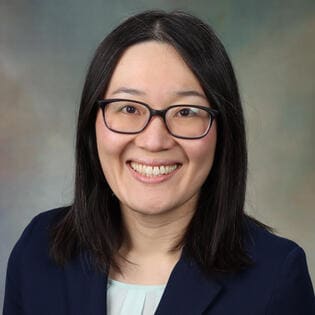 It is with great pleasure that I welcome you to the Advanced Radiation Oncology Fellowship Program at Mayo Clinic in Arizona. We are excited that you are considering joining our team of clinicians, researchers, and educators who are passionate about the field of radiation oncology.
It is with great pleasure that I welcome you to the Advanced Radiation Oncology Fellowship Program at Mayo Clinic in Arizona. We are excited that you are considering joining our team of clinicians, researchers, and educators who are passionate about the field of radiation oncology.
Our fellowship program is designed to provide an exceptional learning environment offering comprehensive, hands-on experience in clinic and research. Importantly, we tailor the program to fit your interests and career goals. You will have the opportunity to refine your clinical expertise in areas such as proton therapy, stereotactic body radiation therapy (SBRT), stereotactic radiosurgery (SRS), intraoperative radiation therapy (IORT), pediatric radiation oncology, in addition to various other clinical and research opportunities. You will have the chance to select clinical and research rotations with many experts in the field. Our multidisciplinary approach to cancer care ensures that you will collaborate with medical oncologists, surgeons, radiologists, pathologists, physicists, and other specialists.
We pride ourselves on fostering a learning environment that nurtures outstanding clinical skills, professional growth, and career development. Our fellows are encouraged to teach and hold leadership roles both within the training program, department, and Mayo Clinic Graduate Medical Education. More than 660 staff physicians across 80-plus specialties and more than 220 residents and fellows are based at the Arizona campus.
The Mayo Clinic Cancer Center is the only NCI-designated Comprehensive Cancer Center with three geographic sites with many collaborative opportunities between the campuses in Rochester, Minnesota, and Jacksonville, Florida. You will have the resources and network of trainees and faculty across the three sites.
You will be mentored by faculty who are committed to helping you develop a personalized career trajectory, whether in academic medicine or community practice.
Randa Tao, M.D.
Advanced Radiation Oncology Fellowship Program Director
Department and faculty
The faculty involved in the Radiation Oncology Residency program includes:
- Fifteen radiation oncologists
- One physician scientist
- Eighteen radiation oncology physicists
- Two cancer biologists
Our radiation oncologists have a wealth of experience in every aspect of radiation oncology. Their expertise includes all areas of clinical practice and basic and applied research, education, and professional activity. This is demonstrated through leadership in national organizations, the certification and peer-review process, and educational involvement.
Our radiation oncology physics consultants work directly with staff physicians and residents and direct the teaching of radiation physics. These individuals demonstrate expertise through involvement in leadership in national organizations, the certification and peer-reviewed process, as well as educational involvement.
Visiting professors
Many prominent professors visit Mayo Clinic each year. They present their work during conferences and special Mayo Clinic Cancer Center presentations, as well as lectures in the department and informal discussions with faculty trainees. Fellows can meet with these individuals to discuss topics in the visiting professors' area of expertise. You are encouraged to take full advantage of these opportunities.
Meet the faculty
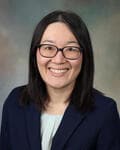 |
Randa Tao, M.D.Fellowship Program Director |
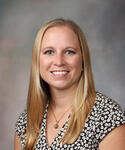 |
Lisa McGee, M.D.Residency Program Director |
 |
Jonathan Ashman, M.D., Ph.D.Proton Director |
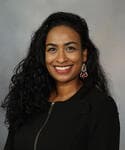 |
Safia Ahmed, M.D.Assistant Professor of Radiation Oncology |
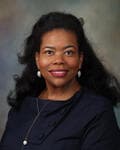 |
Sarah James, M.D., Ph.D.Assistant Professor of Radiation Oncology |
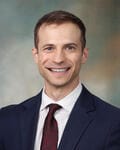 |
Brady Laughlin, M.D.Medical Student Clerkship Director |
 |
Josh Niska, M.D.Medical Student Clerkship Director |
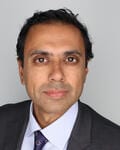 |
Samir Patel, M.D.Department Vice Chair |
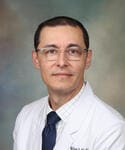 |
William Rule, M.D.Assistant Professor of Radiation Oncology |
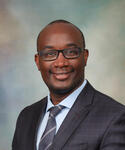 |
Jean-Claude Rwigema, M.D.Associate Professor of Radiation Oncology |
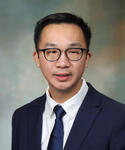 |
Terence Sio, M.D., M.S.Professor of Radiation Oncology |
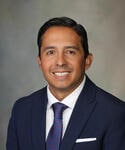 |
Carlos Vargas, M.D.Professor of Radiation Oncology |
 |
Sujay Vora, M.D.Department Chair |
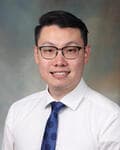 |
Fan Yang, M.D.Assistant Professor of Radiation Oncology |
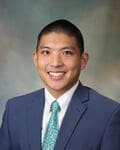 |
Nathan Yu, M.D.Assistant Professor of Radiation Oncology |
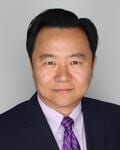 |
Kevin Zhang, M.D., Ph.D.Associate Professor of Radiation Oncology |
Wellness initiatives
As a trainee, your physical and mental health are priorities to Mayo Clinic and the department. Trainees have access to several resources to promote well-being, as well as time off clinical duties to attend appointments.
- Fitness centers
- Groups on campus
- Well-being
Fitness centers
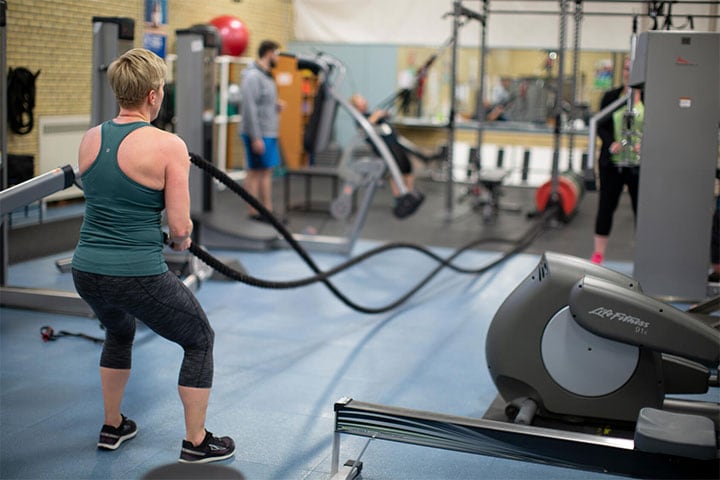 As a resident or fellow at Mayo Clinic in Arizona, you have access to an exclusive learners-only gym and wellness center conveniently located in Phoenix. Additionally, Mayo Clinic residents or fellows at our three campuses get discounted membership fees to area gyms through PerkSpot, the Mayo Clinic employee discount program.
As a resident or fellow at Mayo Clinic in Arizona, you have access to an exclusive learners-only gym and wellness center conveniently located in Phoenix. Additionally, Mayo Clinic residents or fellows at our three campuses get discounted membership fees to area gyms through PerkSpot, the Mayo Clinic employee discount program.
All Mayo employees, including Arizona learners, can also sign up to take live virtual fitness classes or view recorded fitness classes offered by the Dan Abraham Healthy Living Center (DAHLC).
Groups on campus
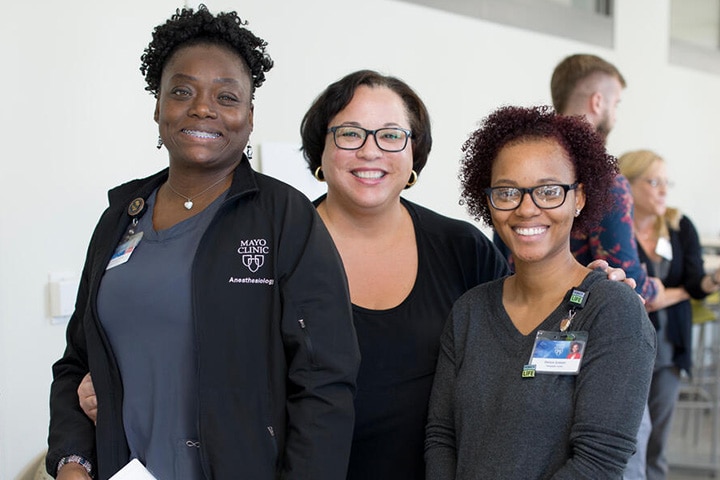 Opportunities to join a variety of groups on campus provide regular social activities and can help enhance your training while connecting with a broad group of peers.
Opportunities to join a variety of groups on campus provide regular social activities and can help enhance your training while connecting with a broad group of peers.
Trainees have the opportunity to join a Mayo Employee Resource Group (MERG) at any time during their training program. MERGs are employee-led affinity groups to promote belonging, increase cultural awareness, and foster an environment of respect and inclusivity. Any Mayo Clinic employee can join a group of interest and choose their level of involvement.
Well-being
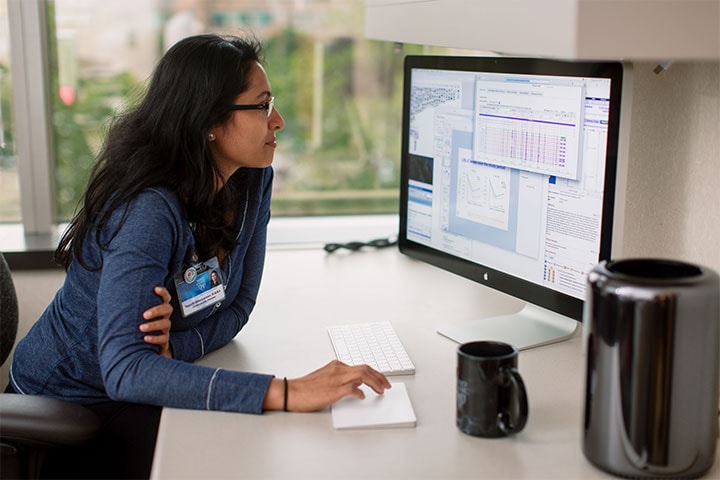 The Office of Academic Support and Well-Being provides resources to promote academic, emotional, social, cognitive, financial, and physical well-being. Career and academic services include academic advising, peer tutoring, and accommodations for learners with disabilities or health conditions. Mental health services, counseling, interview practice, and a variety of enrichment sessions on topics like budgeting, resiliency, and stress and burn-out are also available through the Academic Support and Well-Being office.
The Office of Academic Support and Well-Being provides resources to promote academic, emotional, social, cognitive, financial, and physical well-being. Career and academic services include academic advising, peer tutoring, and accommodations for learners with disabilities or health conditions. Mental health services, counseling, interview practice, and a variety of enrichment sessions on topics like budgeting, resiliency, and stress and burn-out are also available through the Academic Support and Well-Being office.
More from Mayo Clinic School of Graduate Medical Education
/0x0:512x512/prod01/channel_2/media/mccms/content-assets/academics/residencies-and-fellowships/3319834_0363-512X512.jpg)
Choosing Mayo Clinic
/0x0:512x512/prod01/channel_2/media/mccms/content-assets/shared-documents/campus-AZ-3180811-0001-pic-tile.jpg)
Phoenix/Scottsdale, AZ
Campus and community
/0x0:512x512/prod01/channel_2/media/studio-sites/mccms-reference-guide/512X5121676671_3824027_0010_C.jpg)
Stipend and benefits
/1102x0:6393x5291/prod01/channel_2/media/mccms/content-assets/academics/residencies-and-fellowships/advanced-radiation-oncology-fellowship-arizona/mccms-adv-radiation-oncology-WF1189354_0002.jpg)
/0x0:440x220/prod01/channel_2/media/mccms/content-assets/campus-amp-community/arizona/440X220_sidebar-mayo-clinic-phoenix-arizona-is453080663.jpg)